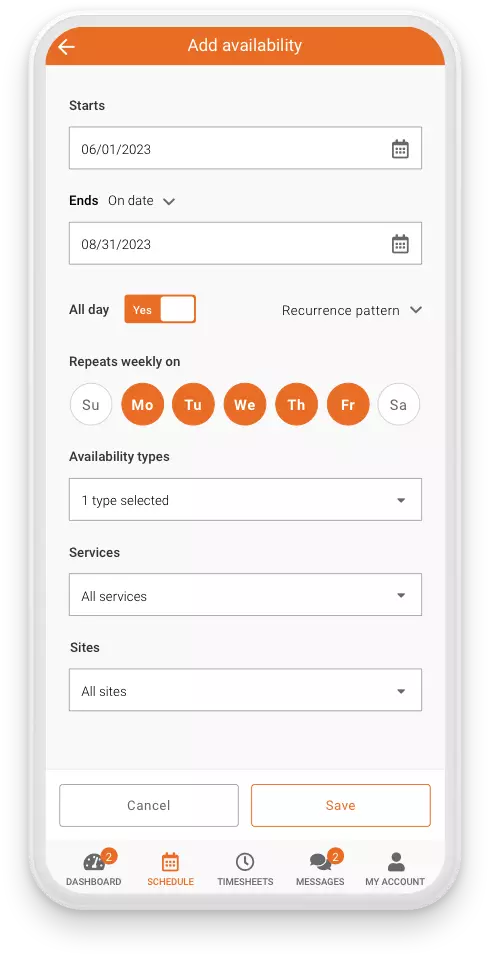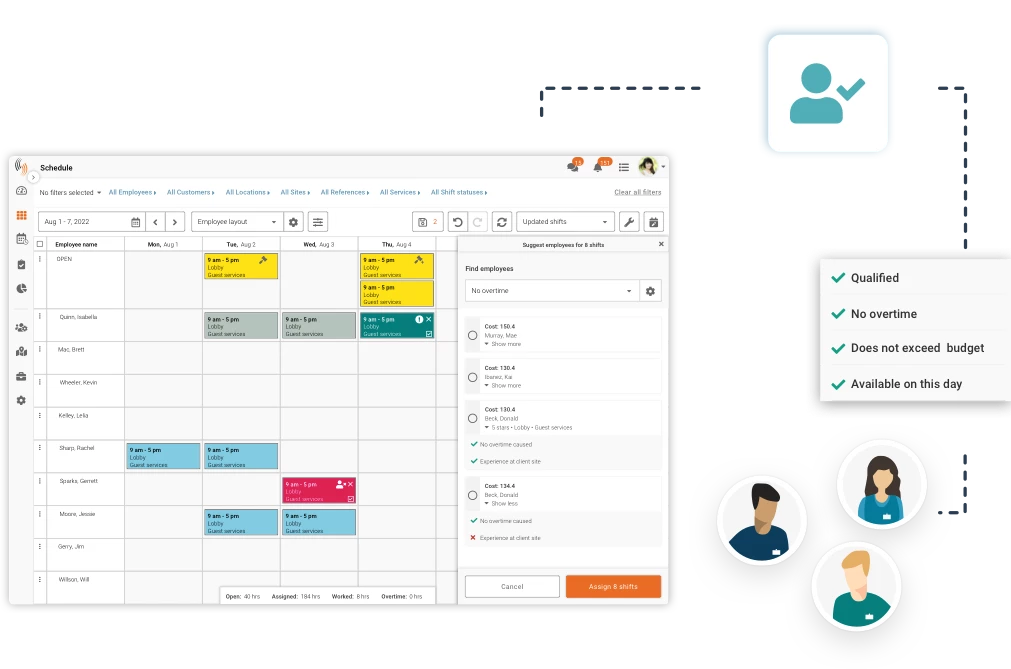Now, more than ever, employers are at the mercy of their employees in terms of demand. Whether it’s through benefits, flexible scheduling, or other terms, employees are demanding more from their workplace than ever before. It’s not just employee demands that need to be met either. There are actual laws around workplace provisions. One of these laws focuses solely on employee scheduling. Predictive scheduling laws to be specific.
Predictive scheduling has become more common over the last decade, with multiple states/cities following suit with Oregon, which was the first to pass a predictive scheduling law. Managers are now left to navigate these complex employee scheduling laws. These laws are designed to give shift workers improved work-life balance.
What Is Predictive Scheduling?

Predictive scheduling laws require employers to provide employees with advance notice of their work schedules, typically at least 14 days ahead of time. These laws are designed to give hourly workers more stability and control over their time, especially in industries where unpredictable schedules are the norm.
These laws are most common in sectors such as:
- Retail
- Hospitality
- Food service
They generally apply to hourly, minimum-wage, and non-salaried employees, especially in workplaces where on-call scheduling is a regular practice.
In addition to advance notice of shifts, predictive scheduling legislation often includes:
- Enhanced recordkeeping requirements
- Notification for potential on-call shifts
- Penalties for last-minute schedule changes
- Telling new hires how many hours they can expect to work
- Giving current employees the chance to take on more hours before hiring new staff
At its core, predictive scheduling is about fairness and transparency, ensuring workers aren’t left guessing when they’ll be working next.
The Common Misconception About Predictive Scheduling
Despite its growing importance, predictive scheduling is often misunderstood.
Many assume it refers to employers using data or software to forecast labor demand and build optimized shift schedules. While predictive technologies are widely used in workforce management, predictive scheduling laws aren’t about helping businesses plan ahead, they’re about helping workers do the same.
In the legal and ethical context, predictive scheduling is about empowering employees by giving them timely, reliable schedules so they can manage their personal responsibilities. Whether it’s arranging childcare, attending school, or simply resting, the goal is to reduce last-minute changes and give workers the ability to plan their lives with confidence.
Because of this confusion, some advocates prefer the term “predictable scheduling”, highlighting that it’s the employees’ ability to predict their own work lives that truly matters.
At the heart of predictive scheduling is a broader conversation about compliance, employee well-being, and work-life balance, a shift from seeing people as flexible resources to seeing them as humans with lives outside of work.
What predictive scheduling means for the Employee
Predictive is all about providing a sense of predictability within employee scheduling. For instance, employers will have to give their employees two weeks’ notice of work schedules. Now you might be wondering, what is the real driver in causing a union-like legislative movement? Well, we think it is the following:
- Many businesses don’t need a consistent amount of workers on a daily & weekly basis
- Many businesses’ employee schedules have variances based on seasonality, market conditions, or internal financial reasons
- Businesses have workers that are on-call with almost no schedule or no assurance of shifts
The result is employees have an unpredictable schedule that can affect their personal lives. Workers may not get enough rest time between closing and opening shifts. Additionally, it may also be difficult to forecast their potential incomes. Also, it makes it hard for employees to plan for school and other jobs.
What predictive scheduling LaWs Means for the Employer

This worker/employee-friendly movement can present difficult obstacles to overcome for many employers. This is especially true in the hospitality, event, venue, and security industries due to the large influx of part-time employees, high employee turnover rates, and ever-changing demands of customers.
Take the NBA play-in tournament as an example, even if it’s not a perfect comparison. The tournament involves teams playing high-stakes games just days before the playoffs officially begin. For instance, a team might lose the 8th seed due to a last-minute win by another team, like the Miami Heat, only three days before the playoff series starts.
If we viewed NBA players strictly as employees under predictive scheduling laws, they might technically have the right to opt out of such short-notice games or request a reschedule. What we might see as a result, is the NBA as a business struggling to adapt to generate as much revenue from ticket sales. Of course, these laws don’t currently apply here, and professional sports have unique dynamics, but it it raises an important point even for large industries like sports too: How will your business adapt to legislative movements that prioritize scheduling compliance over market demand.
A legislative movement like predictive scheduling law can present a great cost to even the largest businesses if not dealt with care and within compliance.
States/Cities with Predictive Scheduling Laws
Every jurisdiction handles its predictive scheduling laws differently.
OregOn
Oregon was the first state to have passed predictive scheduling laws.
The law in Oregon applies to businesses in the retail, hospitality and food industries, with 500 employees or more worldwide. Here’s what it covers:
- Businesses must provide shift schedules at least 14 days in advance, posted in a conspicuous place, including on-call shifts
- They must pay employees a penalty for shift changes without notice, with various rates depending on the type of violation
- Employees are allowed to decline shifts that are not on the written schedule
- Employers must allow employees to provide input on schedules
- Companies must provide employees at least 10 hours between shifts on back-to-back days, unless approved by the worker, with the employee receiving time and a half if they are scheduled in that manner

This last one addresses the common issue of “clopening” shifts which are very common in hospitality. This occurs when an employee works the closing shift, the night before working the opening shift. As you can imagine, this takes its toll on employees who may have to do it multiple times a week.
Chicago, Illinois
In Chicago, predictive scheduling laws are known as the Fair Workweek Ordinance. It applies to organizations with 50 or more employees in the following industries:
- Building services
- Healthcare
- Hotels
- Manufacturing
- Restaurants
- Retail
- Warehouse service
Employees are covered by this law if they meet certain requirements. They must make at most $26 an hour or $50,000 a year. The ordinance provides employees with the following benefits:
- The right to decline unscheduled hours
- Predictable pay with additional pay when hours are added/changed
- Pay for canceled hours and shifts – 50% of pay for the entire shift when done with less than 24 hours’ notice
- The right to decline shifts when scheduled within 10 hours of each other, or receive 1.25 times the rate of pay if they do work
- A good faith estimate of their work schedule from the employer
- From this year, employers must post schedules 14 days in advance
Emeryville, California

Emeryville has a reputation for being one of the most employee-friendly cities in the States. Similar to Chicago, the predictive scheduling laws here are known as the Fair Workweek Ordinance.
Employees of retail businesses with 56 or more employees globally, fast food businesses with 26 or more employees globally, and 20 or more employees in Emeryville are covered by this law. Here’s what’s covered:
- Employers must provide shift schedules 2 weeks in advance
- They must provide initial estimates of an employee’s work schedule upon hire, including on-call shifts
- Companies must also compensate for schedule changes, which differ based on when the change is made
- They must offer existing part-time employees additional work before hiring another employee
- Provide rest periods, defined as the first 11 hours after the end of the previous calendar day’s shift and the first 11 hours following the end of a shift that spanned two calendar days (if an employee does work, they receive time and a half)
As you can see, this is in line with the ordinance in Chicago also. It has been in law and enforced since 2018.
New York, New York
New York city passed its predictive scheduling laws in 2017. These are known as Fair Workweek Laws. Unlike other cities/states, these laws differ slightly depending on the industry. The two main industries that are covered are retail and fast food.
Retail
- Employers must provide workers with schedules 72 hours in advance
- Workers are allowed to decline last-minute shifts
- Employers cannot cancel a scheduled shift with less than 72 hours’ notice
- Employees are not required to work without 72 hours’ notice, unless they agree to it
Fast Food

- Employers must provide work schedules 14 days in advance of the start of the schedule
- Workers are entitled to regular schedules that stay the same week-to-week
- Employers must pay premiums for schedule changes or “clopenings”
- Employees must be given the opportunity to decline extra work or “clopenings”
- Current employees must be given the chance to work more regular hours before hiring new employees
By this point, you get the gist of the different predictive scheduling laws across the different jurisdictions. We won’t go into detail, but other cities that do have similar laws are:
- Philadelphia, Pennsylvania
- San Francisco, California
- Seattle, Washington
- Berkley, California
- Los Angeles, California
The Benefits of a Predictable Schedule
The main goal of predictive scheduling laws is for employees to receive more stable, predictable schedules. This helps them plan their schedules, which can improve work-life balance. For part-time and on-call employees, it also helps them forecast potential income.
The enhanced work-life balance alone provides many benefits. A 2019 study states that work-life balance improves employee performance and productivity. The level of productivity assisted in the survival and growth of the organizations in the study.
In another study focused on healthcare workers, a better work-life balance showed lower burnout. Patient safety risk was also reduced when workers had a better work-life balance.
While predictive scheduling may be less flexible and potentially costly for employers, the benefits of predictive scheduling are worth considering.
How To Implement Predictive Scheduling

The best way to implement predictive scheduling for your business is to have a solid scheduling process. Here are some ways to ensure your scheduling process is as efficient as possible:
- Ensure your employees’ availabilities are always up to date. This helps you schedule your employees accurately and reduce potential revisions to the schedule.
- Have an effective way to communicate your schedule to employees. This ensures you’re compliant with predictive scheduling laws.
- Allow your employees to make changes to the schedule within a certain time period. Once your employees share changes, you can implement them right away and communicate changes as soon as possible.
- Keep an accurate record of employees’ time and attendance. Analyzing scheduled shifts vs. actual shift times can help you better schedule your employees for the future.
The best way to implement predictive scheduling and solidify your scheduling process is to use scheduling software. Employee scheduling software automates many aspects of scheduling and helps you save time scheduling.
For example, Celayix lets you easily create schedules in a few minutes, and provide as far in advance as you need. This way, you completely eliminate any risk of non-compliance and any additional costs. Also, employees can easily edit their availabilities, or swap shifts.
Both managers and employees get notifications on any shift changes. Of course, managers will need to approve changes before they are set in stone. Celayix also has self-scheduling & shift bidding features that allow a manager to publish shifts, and let employees pick them up. This saves time for the manager and also lets employees schedule their lives.
If you’d like to hear more about how Celayix can help you to manage predictive scheduling laws, reach out to Solutions Advisor today!




